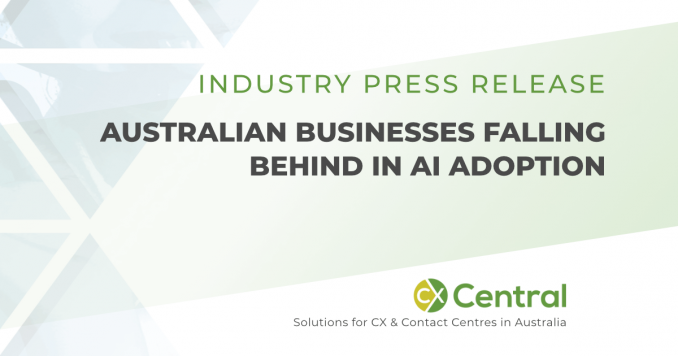
AI adoption in Australia falling behind global adoption
SYDNEY, February 21, 2018 – A 2017 report gauging Australian business sentiment towards AI (artificial intelligence) has revealed high levels of awareness and a willingness to invest in the technology’s potential to reveal critical business insights and new market opportunities.
The ‘Outlook on the Australian AI market landscape in Australia’ study was conducted by research analysts House of Brand on behalf of Sydney-based AI specialists, Daisee, which today announced its official launch into the Australian market.
The report involved a quant survey of 200 Australian organisations, as well as detailed interviews with senior executives at some of Australia’s biggest and most successful companies.
It revealed a big increase in Australian business expectations for how AI will enhance product development and improve processes across all industries over the next five years, especially in the technology, financial/professional services and media industries.
Overall, while AI adoption in Australia is currently low, Australian companies forecast spending significantly more on AI between now and 2022.
In particular, the report noted a doubling in the number of Australian companies expecting to invest over $1 million in AI between now and 2022, rising to 13% from 6% today.
However, compared with global leaders like the US and UK, Australia is well off the pace in terms of actual deployment of AI. Only 14% of Australian companies reported having adopted AI, compared with the global average of 23%.
Conversely, almost 70% of Australian organisations surveyed said they were yet to adopt AI solutions, compared with a global average of 54%.
Worldwide, 23% of organisations are known to be piloting AI, while the Australian outlook report found only 17% of local companies were at this stage.
Crucially, the report also found local companies have a relatively poor understanding of their role in reaping the rewards of AI solutions, especially in terms of ensuring enough high-quality data is sourced to train and drive the models.
However, a proportion of companies reported having a very sophisticated grasp of data-related challenges.
Using these and other indicators, the report divided Australian organisations into four categories: Pioneers; Investigators; Experimenters; and Passives, reflecting in descending order different levels of awareness and adoption.
It found 9% of Australian companies currently qualify as pioneers, 35% investigators, 12% experimenters with pioneers making up the biggest group with 44%.
The report confirmed Australia lags market leaders such as the US and UK in terms of AI investment, deployment and understanding, with each boasting higher numbers of Leaders and fewer Spectators.
According to Daisee co-founder and CEO, Richard Kimber this should serve as a wake-up call for the large number of Australian businesses – and government agencies – still sitting on their hands, exposing themselves to higher levels of risk and opportunity costs.
“It’s a widely held view that companies taking no action on AI will see the gap between them and those who embrace it will widen exponentially over the next five years, and to a far greater degree than we’ve seen before,” he said. “This has implications not only for their success and competitiveness in Australia, but increasingly they will feel more pressure from international players.”

This sense of urgency is reinforced by the fact that as a group, Spectators surveyed for the report forecast a 93% increase in AI investment over the next five years, a fact which should spur trailing laggards into action.
Australian companies highlighted a number of barriers slowing their adoption of AI technologies, most notably concerns around security, lack of available talent, low levels of ‘leadership’ support for AI deployments, and the lack of a clear business case.
The report also showed pioneers and investigators had a vastly better understanding of AI’s potential and the steps needed to reach it, compared with experimenters and pioneers.
Investigators are companies that have attained a high level of awareness and understanding of AI but are yet to act on it, with experimenters exhibiting lower levels of understanding with more hands-on-experience.
Encouragingly, the proportion of Australian companies ranked as investigators (35 %) was higher than the global average, suggesting both a higher-than-expected level of sophistication when it comes to grasping AI, and an exciting untapped opportunity to increase performance and competitiveness.
“We see this as an especially Australian trend, whereby many companies understand the importance of AI but are wary of the hype and misinformation in the market and are therefore taking a wait-and-see approach,” Kimber added.
Australia also has a high proportion of experimenters, indicating local businesses are also prepared to dip their toes in the water, even though much of the AI activity to-date has involved simple applications like chatbots.
Overall, only a few Australian organisations said AI had had a significant impact on their business to date, but expectations rose sharply when asked about AI’s likely impact over the next five years.
The study’s authors noted the tech, financial/professional services and media industries had the highest levels of deployment and expectations for AI over the next five years.
More broadly, Australian companies said AI would play an important role between now and 2022 in improving products and services, streamlining operations and procedures, and reducing costs.
Further, Australian companies expect IT and marketing would be among the departments most affected by AI in the short term.
Meanwhile, the study also showed responsibility for spending on AI was shifting from the former to the latter, with this trend expected to continue apace.
“This study shows it’s clear Australian companies have some catching up to do when it comes to actually understanding and deploying the many business benefits of implementing AI technologies effectively,” said Daisee’s Kimber. “But it’s also clear that AI adoption in Australia is at a tipping point with awareness, investment and real action on AI expected to rise sharply over the next five years.”
ABOUT DAISEE
Daisee stands for ‘Deep Artificial Intelligence Software for Enterprise Ecosystems’.
An Australian software application company, Daisee provides the technology, talent and techniques required to accelerate AI projects for business. The company has raised over $8m from Alium Capital, Thorney Investments and a number of private investors in its initial round of funding.
The executive team is drawn from the financial services, telecommunications and digital intelligence industries, who have joined to leverage advanced AI R&D out of Australian Universities.
Recommended further reading: Customer Service Chatbots on the Increase in Australia
Looking for a list of suppliers for Chatbots, Artificial Intelligence, Virtual Assistants and more in Australia? Search the free CX Directory>>>

Be the first to comment